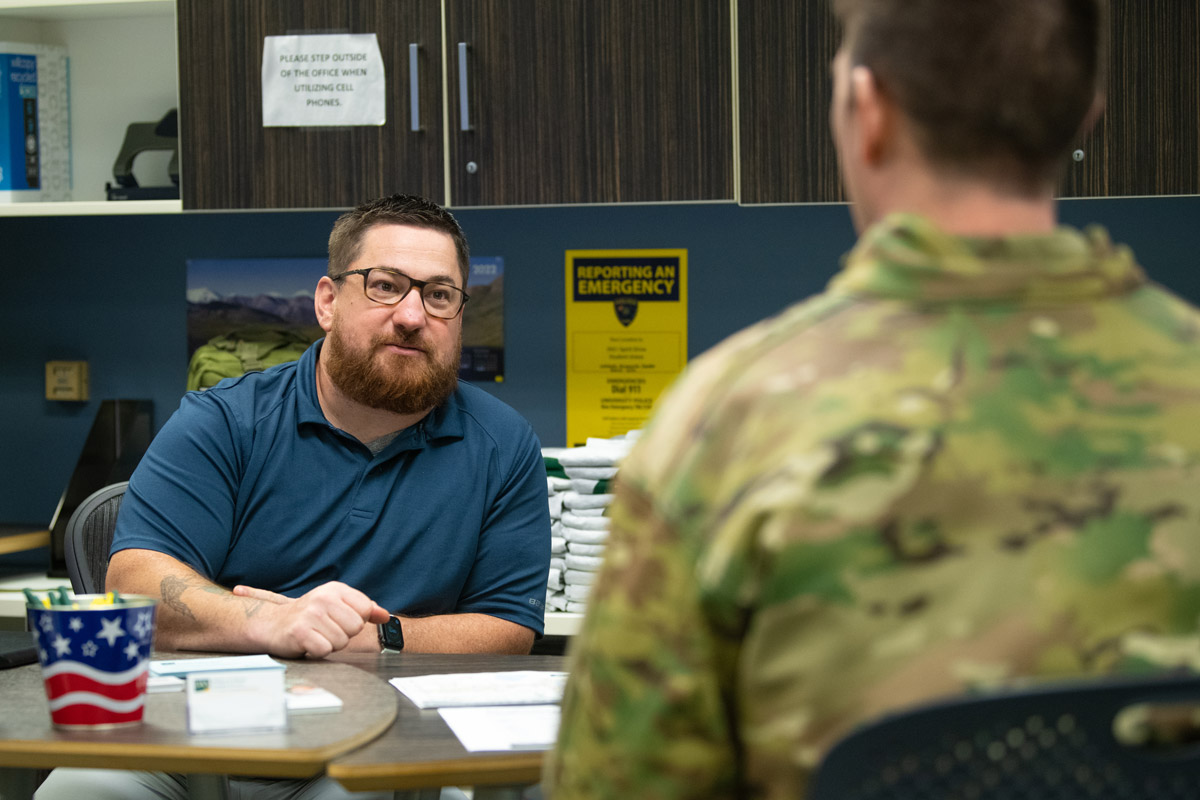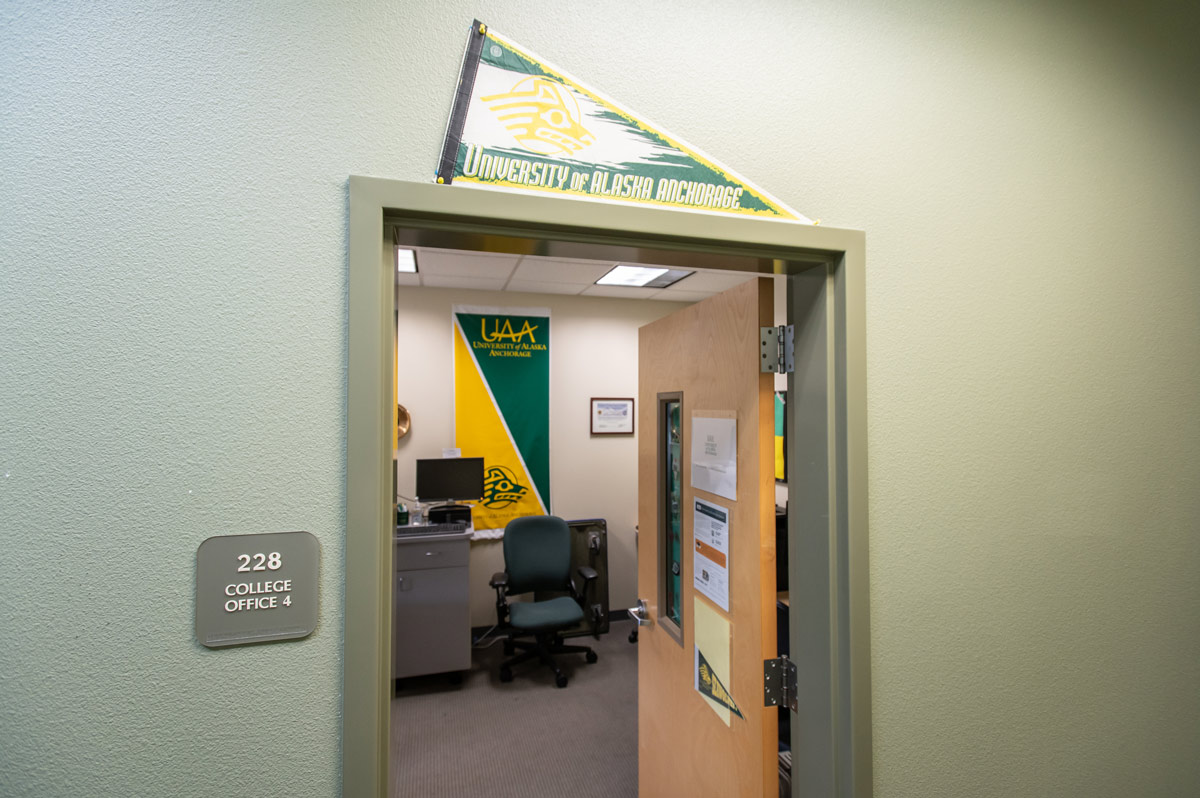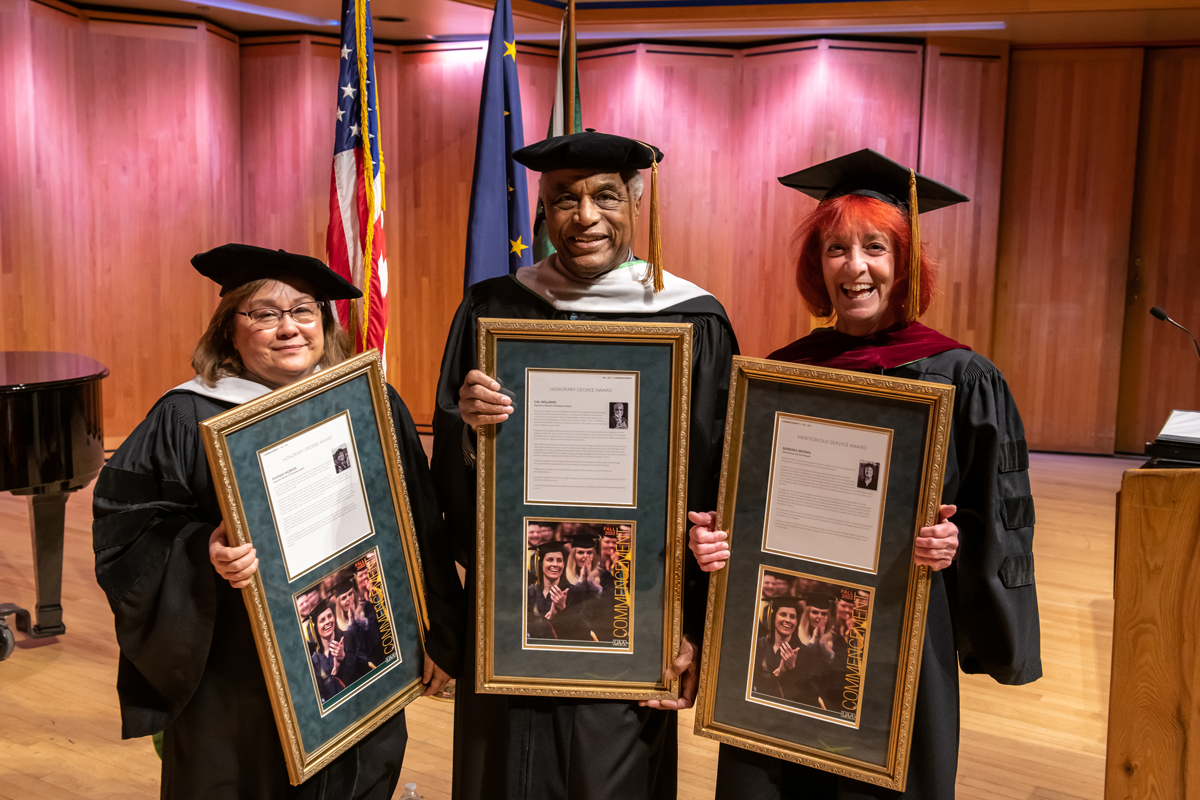Serving those who serve: UAA earns silver status as Military Friendly School
by Joe Selmont |

UAA has been recognized for the 14th consecutive year as a Military Friendly School, earning silver status for the first time. UAA’s elevation from bronze status last year is a reflection of its ongoing efforts to develop and maintain a culture of serving those who serve. This culture centers on good policies and practices, meaningful investments in benefits, and resources and services for military and veteran students.
“To me, this shows that UAA is dedicated to this specific student population. We’re making informed decisions and policies to help students be successful and achieve graduation,” said Peter Clemens, UAA’s Military and Veteran Student Services program director.
Affordability for military students
UAA recently created a flat-rate tuition for students who are active duty, reserves or national guard members. Tuition is now capped at $250 per undergraduate credit hour, and most fees are waived, ensuring affordability for military students. This policy was introduced to bring UAA’s costs in line with tuition benefits offered by the military.
“There is a real commitment to providing resources to military and veteran students,” Clemens said. “That means investing in the new policy on flat-rate tuition. It means investing in staff who are subject matter experts on the processes these students must navigate — staff whose entire jobs are focused on serving military and veteran students.”

Navigating complexities
Clemens’ office is dedicated to staying up to date with ever-changing federal processes that affect members of the military. For example, Clemens said Veterans Affairs (VA) recently began requiring students who use post-9/11 GI Bill benefits to verify their attendance each semester in order to receive a housing allowance. Without UAA’s specialized support, it’s likely important details would fall through the cracks — and many military and veteran students would fall through, too.
Bekky Virgil, a male-to-female transgender U.S. Army veteran (2011-2015) and political science student at UAA, said the university helped navigate challenges during the pandemic. She currently serves on a national board to advocate for high-quality medical treatment for all veterans through the VA, and she hopes to one day leverage her military experience, especially her experience as a transgender service member, to run for political office.
“When the pandemic hit, it was a mess,” she said. “With the transition to online learning, it looked like we could lose a lot of our education benefits from the VA. But when UAA got word of this, they acted really quickly. They emailed the whole student body to say they were aware of the situation, that they were working with the VA to ensure that students got their benefits, and that they would take care of us if anything happened.”
Virgil added, “In the middle of so much else stressful going on, it was a relief to know that UAA was looking out for us.”
Ramping up an on-base presence at JBER
In the past couple of semesters, UAA has also renewed its relationship with Joint Base Elmendorf Richardson (JBER). Between the $100 million in budget cuts to the UA system since 2014 and the onset of the pandemic in 2020, for years there had not been adequate capacity to support face-to-face services on JBER. But UAA is ramping up its on-base presence. Clemens said that UAA’s offices in the Elmendorf and Richardson Education Centers are now staffed at least a few days a week, which gives service members a reliable place to seek information and ask for help. He also pointed to the growing number of classes taught on JBER.

Support from faculty
However, for many military and veteran students the most important support they receive is from their professors.
Steve Cherry, an Air Force veteran (1999-2004) and current member of the Alaska Air National Guard, moved to Alaska in 2002 when he was assigned to Elmendorf. He is a student in UAA’s Kinesiology program and he intends to obtain a doctorate in physical therapy. He wants to work for the VA to help vets rehabilitate after serious injuries.
“It’s never been easy to be a student and serve at the same time,” he said. “Throughout my college career, I was called up for duty multiple times. But my faculty members at UAA were always flexible. I was even able to continue with a nine-credit load from Afghanistan in 2006. The professors worked with the military’s test proctoring service so I didn’t miss exams.”

Maria Canon, a current Legal Studies major who plans to go on to law school after graduating this semester, has served in the Army for nearly 12 years. She was born in Colombia and moved to Virginia when she was 11 years old. She and her husband, who is in the Army’s Airborne Infantry, transferred to Alaska in 2019.
“My degree has taken me nearly 10 years to obtain,” she said. “I started at other schools, where professors gave me a hard time whenever I was called up for training or service. Since coming to UAA, though, it’s been totally different. Now if I need to miss class because of my career with the Army, which happens at least once per semester, I’m not worried about it. I know my professors understand, and I know they’ll work with me to get things done. UAA just has this culture of respect for military service.”
While Clemens, Virgil, Cherry and Canon all believe UAA rightly earned recognition as a Military Friendly School, they also pointed out there is always more UAA can do to support its military and veteran students, and that there is always room for growth. For Clemens, his team and the entire UAA community, this gives UAA a target — and the aspiration to achieve gold status in future years.
GI Bill® is a registered trademark of the U.S. Department of Veterans Affairs (VA). More information about education benefits offered by VA is available at the official U.S. government Web site at https://www.benefits.va.gov/gibill.
 "Serving those who serve: UAA earns silver status as Military Friendly School" is licensed under a Creative Commons Attribution-NonCommercial 4.0 International License.
"Serving those who serve: UAA earns silver status as Military Friendly School" is licensed under a Creative Commons Attribution-NonCommercial 4.0 International License.














